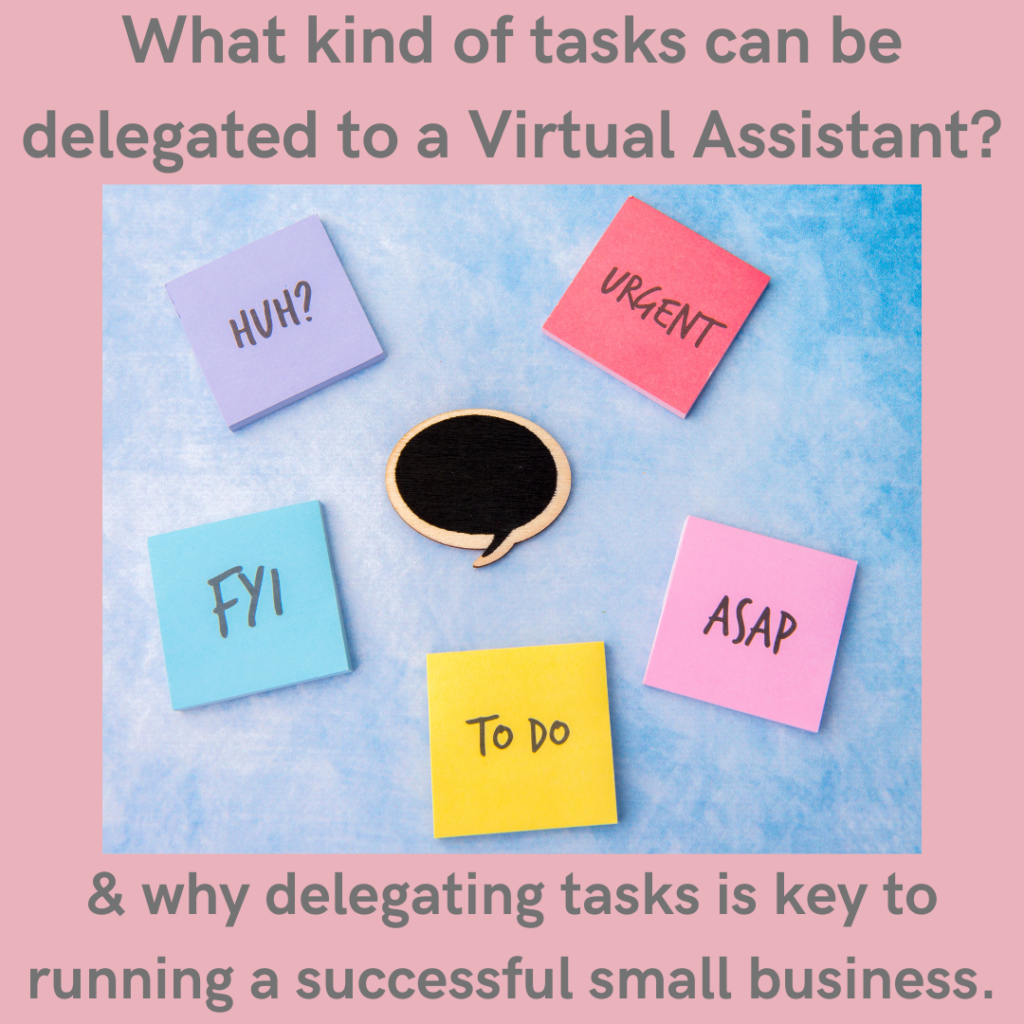
What kind of tasks can be delegated to a Virtual Assistant?
I often get asked what kind of tasks can be delegated to a Virtual Assistant. I’ve made a list of the 10 most popular tasks that I am asked to complete and why delegating tasks is key to running a successful small business.
Delegating tasks to a Virtual Assistant can help you free up your time, which allows you to focus on more important aspects of your business. Here are ten tasks that you can delegate to a Virtual Assistant –
- Email management : A virtual assistant can help you sort through your inbox, respond to emails, and flag important messages.
- Social media management : You can delegate the task of managing your social media accounts, including scheduling posts and responding to comments.
- Content creation : A virtual assistant can help you create content for your website, blog, or social media channels.
- Data entry : A virtual assistant can help you input data into spreadsheets, databases, or other software.
- Blog Writing : You can delegate the task of managing your blog posts for you, saving you a great deal of time.
- Email Marketing : A virtual assistant can help you set up and run your email marketing. Email marketing is still one of the best marketing tools to date.
- Customer support : You can delegate the task of responding to customer inquiries and resolving issues.
- Web Design & Management : You can delegate the task of setting up a website for your business and also the management of the site.
- Appointment scheduling : A virtual assistant can help you manage your schedule by setting up appointments and reminders.
- Research : You can delegate the task of conducting research on a particular topic, including industry trends and competitor analysis.

Delegating tasks is a fundamental aspect of running a successful small business, and it’s importance cannot be overstated. In the dynamic and often resource-constrained environment that characterizes small enterprises, effective delegation is a strategic move that contributes to growth, efficiency, and the overall success of the business. We will explore the key reasons why delegating tasks is essential for small business success.
Why delegating tasks is key to running a successful small business.
Focus on Core Competencies:
Small business owners often wear multiple hats, juggling various responsibilities ranging from operations to marketing. Delegating tasks allows entrepreneurs to focus on their core business activities. By entrusting routine or specialised tasks to a capable virtual assistant, business owners can invest their time and energy where they can add the most value.
Optimal Resource Utilisation:
Small businesses frequently operate with limited resources, including time, personnel, and finances. Delegating tasks to a virtual assistant ensures that available resources are utilised optimally. By assigning responsibilities to individuals with the relevant skills and expertise, businesses can operate more efficiently and effectively, maximizing the impact of their investments.
Increased Productivity:
Efficient delegation leads to increased overall productivity within a small business. When tasks are assigned to a virtual assistant, the collective output is higher. It ensures that work is distributed evenly and completed in a timely manner, thereby enhancing the productivity of the entire team.
Business Scalability:
Successful small businesses aspire to grow and scale. Delegating tasks is a fundamental component of scalability. As the business expands, the workload naturally increases. Delegating allows for a seamless transition into growth phases by distributing responsibilities and preventing overwhelm. It enables the business to scale without sacrificing quality or customer satisfaction.
Improved Decision-Making:
Delegating tasks involves entrusting responsibility to individuals within the organisation. This not only encourages a collaborative approach but also allows for diverse perspectives in decision-making. Different team members bring unique insights and skills to the table, fostering a culture of innovation and more informed decision-making.
Enhanced Efficiency and Specialisation:
Delegating tasks enables individuals to specialise in their areas of expertise. Rather than expecting one person to handle a multitude of tasks, businesses can leverage the specific skills of a virtual assistant. This specialisation leads to enhanced efficiency, as tasks are completed with a higher level of proficiency and attention to detail.
Reduced Burnout:
Small business owners are often at risk of burnout due to the demands of wearing multiple hats. Delegating tasks alleviates this burden, reducing the likelihood of burnout. When responsibilities are distributed strategically, it allows business owners to maintain a healthier work-life balance, fostering long-term sustainability and success.
Time for Strategic Planning:
Delegating routine tasks to a virtual assistant frees up valuable time for small business owners to engage in strategic planning. Whether it’s devising growth strategies, exploring new markets, or innovating products and services, having the time to focus on the bigger picture is essential for the long-term success.
Adaptability and Resilience:
In a rapidly changing business environment, adaptability is key to survival. Delegating tasks to a virtual assistant ensures that the business is agile and can respond effectively to changes in the market or industry. A well-delegated team is better equipped to handle unforeseen challenges, contributing to the overall resilience of the business.

Remember, the key to successfully delegating tasks is to clearly communicate your expectations and provide detailed instructions. By doing so, you can ensure that your virtual assistant is able to complete tasks efficiently and effectively, allowing you to focus on what matters most.
